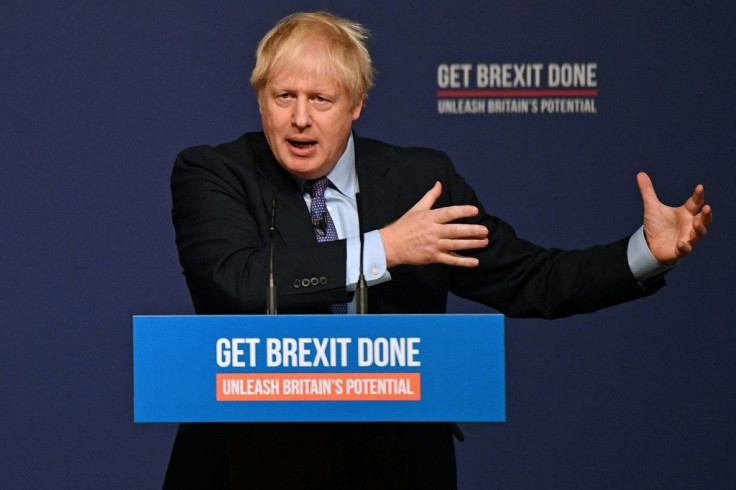Did Nationalist Hindus Play A Role In Helping To Elect Boris Johnson In UK?

The U.K.’s large and diverse South Asian community likely played a significant role in helping Conservative Boris Johnson get elected as prime minister. But there are signs that nationalist Hindus from India itself may have agitated on behalf of the Tories against Labour.
Four months ago, after Indian Prime Minister Narendra Modi moved to rescind autonomy from the part of Kashmir that New Delhi controls, send in military forces and enact reforms, the British Labour Party condemned the decision.
Labour denounced the “enforced disappearance of civilians, the state-endorsed sexual violence of women by armed forces, and the overall prevalence of human rights violations in the region” as well as “the house arrest, imprisonment of mainstream politicians and activists and restrictions on journalistic freedom.”
As a result, Modi supporters both in India and U.K. started a campaign to urge British Indians not to support Labour – despite the fact that most South Asians in the U.K. had long been in Labour’s corner.
Barnie Choudhury, professor of professional practice at the University of Buckingham, wrote Labour’s condemnation of Modi turned many Hindu Indians in the U.K. into Johnson voters.
Modi’s ruling party, the Bharatiya Janata Party, usually called BJP, has an entity called the Overseas Friends of BJP, which has 40 chapters around the world and connects Indian expatriots with the BJP in India.
Kuldeep Singh Shekhawat, the head of its U.K. chapter, declared his group would campaign for the Conservatives, not Labour.
“We have a team in each constituency which is going round with the Tory candidate leafletting, speaking to people and persuading them to vote Tory,” he said. The Kashmir issue, he said, turned most U.K. Indians against Labour.
“If the entire Indian community in the U.K. votes Tory, we will see a swing of around 40 seats to the Tories,” Shekhawat said prior to the election “This will swing the actual election result.”
Shekhawat’s group has also targeted some Labour MPs for not being loyal enough to India, including Tanmanjeet Singh Dhesi, a Sikh who represents Slough, west of London.
“Not a single Hindu will vote for Tanmanjeet Singh Dhesi this time,” Shekhawat said. “Hindu voters think he is working closely with the Pakistani community. He is always seen with Pakistanis and goes to the Pakistan high commission. He is a vice chair of the All-Party Parliamentary Group on Britain-Pakistan Trade and Tourism and was vice chair of the [All-Party Parliamentary Group] Kashmir group. Why is that?”
Kapil Dudakia, a Hindu Tory businessman, reportedly may have reached out to British Hindus with messages on WhatsApp and encouraged them to vote Conservative.
Shekhawat’s group also sought to remove six other Labour MPs of Indian orgin who are believed to support Sikh separatism in India (that is, the formation of a Sikh homeland called Khalistan).
“We are not supporting them because some of them have a Khalistani tag. They are not doing anything for us or looking at India as a sovereign nation,” Shekhawat said. “Some of them have signed letters against India.”
Charles Parton, senior associate fellow at the Royal United Services Institute think tank, said Shekhawat’s campaign would not constitute "foreign interference" as long as it is run by British citizens and not funded by a foreign government.
"If the Overseas Friends of the BJP are U.K. citizens, self-funded, then they have a right to urge other U.K. citizens to vote for Party X or Party Y," Parton told CNN.
In addition, Jeremy Corbyn and Labour have been portrayed as being pro-Muslim and pro-Pakistan.
“Lots of people we know said they will not vote Labour this time. I think they [Labour] don’t care – they only want Pakistani votes,” said Leela, a British Indian from Blackpool.
Trupti Patel, the president of the Hindu Forum of Britain, told CNN: "The issue here is Jeremy Corbyn is anti-India and anti-Hindu".
Just days prior to the election, a video surfaced of a man in a Hindu temple in England urging his compatriots to vote Conservative, calling the Labour Party "anti-Hindu", "anti-Modi" and "anti-Sikh.”
"Hindus and Sikhs feel completely let down by the Labour party," the man said. "They [Labour] are supporters of separatist jihadis wanting to cause violence, strife and division all over the world, particularly in India".
On that same day, Johnson visited the Swaminarayan Hindu temple in London, and promised to support Modi.
On the campaign trail, Johnson repeatedly praised the Indian community in Britain.
Indians, he said, represent about 2% of the U.K. population, but contribute 6% of the gross domestic product. “They are massively important to the success of our country and I’m lost in admiration [for them],” he said.
Johnson also said he would like closer trade ties with India.
“I have already good relations with Prime Minister Narendra Modi, and we have lots of plans to do things together and with the living bridge [the Indian diaspora],” he said. “They are fantastic. They are one of the greatest national assets of this country. No question.”
Indeed, Indian Hindus in the U.K. have been gravitating toward the Conservatives for years. While only 30% of British Hindus voted Conservative, that figure jumped to 40% in the 2010 general election.
© Copyright IBTimes 2025. All rights reserved.





















